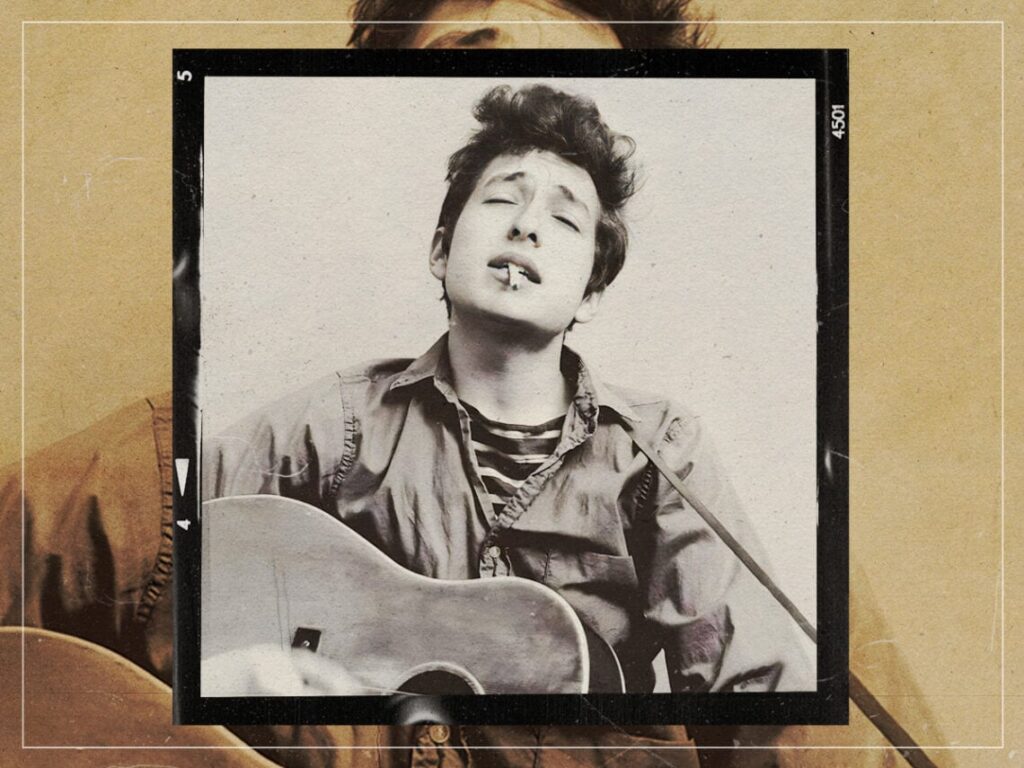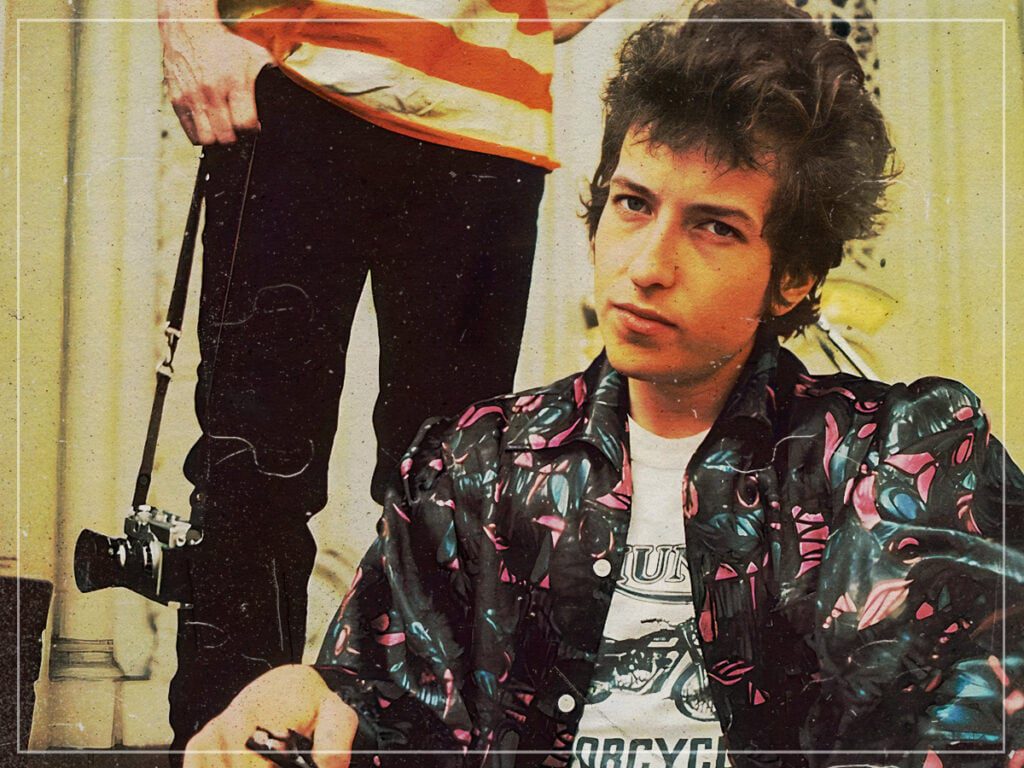Was Bob Dylan the original punk?
 Posted On
Posted On
(Credits: Far Out / Columbia Records)
During his high school years, Bob Dylan and his band, The Golden Chords, engaged in raucous performance of Danny & The Juniors’ ‘Rock and Roll Is Here To Stay’ that reverberated through the halls with such intensity that the principal cut the microphone. Years later, as Dylan delved deeper into the realms of rock music and nurtured a profound appreciation for the timeless melodies of folk, he stumbled upon a profound epiphany: the rebellious spirit of rock ‘n’ roll, as it stood, simply wasn’t cutting it.
Dylan’s ascent onto the music scene was gradual. From his fiery performances during his school days to his later ground-breaking fusion of rock and folk sensibilities, he absorbed influences. He honed his craft until his creative fire was primed to illuminate the path that rock legends had paved with sweat and determination. For Dylan, rock, in its existing form, fell short. In his eyes, it lacked the depth to authentically reflect the complexities of life. According to the troubadour, rock “didn’t reflect life in a realistic way.”
It would be Dylan’s inherent inclination to shatter conventions that ultimately solidified his name in music history as the greatest musician and songwriter of all time. However, this legacy was intricately woven with the essence of his uncompromising spirit—a spirit characterised by lyrical fearlessness and an unwavering determination to confront societal conventions head-on. As a result, Dylan’s unyielding ethos in his defiance of the status quo proved his position as a true pioneer of punk-adjacent musical rebellion.
From the moment Robert Zimmerman became Bob Dylan—a name he chose to better represent himself in his incredibly intricate world of liberation—his status as the punk patient zero manifested in various ways. A 1961 review of Dylan’s Gerde’s Folk City performance in The New York Times significantly bolstered his career by describing him as a folk “stylist” as he melodically navigated various issues and challenges faced by the youth of the time.
The essence of what would later blossom into the punk movement found its earliest form in Dylan’s thematic explorations. Through his unapologetic challenge of the status quo, Dylan injected his music with a gritty realism that starkly contrasted with the subtle nuances of earlier rock sensibilities. Drawing from the raw authenticity of folk music, he crafted a sonic landscape that resonated with the unpolished truth of the human condition, setting a precedent for the raw, unfiltered expression that would come to define punk rock.
Dylan’s second album, The Freewheelin’ Bob Dylan, did what it said on the tin, establishing him as an innovative singer-songwriter whose protest songs questioned the social and political zeitgeist. The songs on the album, like ‘Blowin’ in the Wind’ and ‘A Hard Rain’s a-Gonna Fall’, introduced a new stream-of-consciousness format into folk music that relied more on reflecting the concerns of the generation. Dylan seemed to possess a natural understanding of how the troubled sections of society felt and filtered this into his music, the kind that charmed some but disturbed others.
The vanguards of the mainstream punk movement embodied not just a musical rebellion but also a broader anti-establishment ethos reflected in their attitude and actions. The term “punk” often conjures images of liberty spikes, necklaces, and dark leather jackets alongside a visual manifestation of the middle finger aimed at turning your back on societal norms. While Dylan may not have pioneered the subculture’s clothing trends, his attitude in interviews and recording sessions exuded a spirit that seamlessly aligned with those of punk icons. His unapologetic candour and defiant stance resonated with the ethos of movement, making him a flame to the fire before it had even been fully ignited.

As the crowd at the 1965 Newport Folk Festival waited patiently for Dylan’s arrival, what they likely didn’t suspect was that Joan Baez’s introduction to the folk legend would take on a significantly different direction, causing many to re-evaluate their opinions on the person who had become their most cherished musical icon. In one swift electrical motion, Dylan proved once again that his career was unpredictable, and that he wouldn’t be a passive participant in the wheels of the counterculture movement. The set the following year would reiterate his point as he proceeded to deliver a performance that was half acoustic, half electronic.
Echoing the devil-may-care attitude of the anarchistic punk rebellion, Dylan made his opinion of the press abundantly clear—a manifestation that would often ripple out and onto those around him. Even poor Baez, who remained loyal and believed in the singer from day one, seemed somewhat cast aside, as evidenced by D. A. Pennebaker’s documentary film Dont Look Back, where Dylan comes across as nothing other than his authentic self.
While Dylan’s presentation of self in Dont Look Back shows the singer as someone who oscillates between moments of introspection, wit, and musical genius, he also seems unapologetically cutting, challenging both journalists and musical partners by offering cryptic responses and sardonic retorts. As a result, what it offers is a small glimpse into Dylan’s immense presence both on stage and off, his rebellious nature and ability to effortlessly reject pretence exuding from him before he even opens his mouth.
When the punk movement arrived in the mid-1970s, aggression, retaliation, and nonconformity reigned supreme. Musical idols stood as figures of its iconoclastic attitude, delivering raw, unpolished sounds that tackled many of the issues felt by working class and marginalised groups. Punk served to expose every single crack in society, calling for a revolution where those who had been wronged by society finally had the space to stand up and demand something better.
While this was seen as an immense rallying cry for change, Dylan had already embodied these exact sentiments over a decade earlier and changed the music world forever as he did.
[embedded content]


